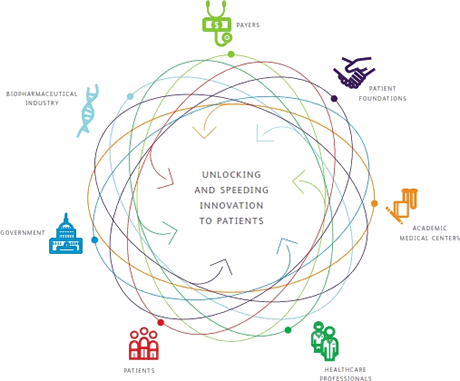- Science
- Clinical Trials
- Guide to Clinical Trials Your participation makes a difference
- Clinical Trials in Children Designed to improve kids' health
- Data and Results Sharing our Results
- Integrity and Transparency Building Trust
- Diversity Equity and Representation
- Plain Language Study Results Trial Result Summaries
- Expanded Access & Compassionate Use Possible Treatment Options
- Find a Trial
- Areas of Focus
- Rare Disease Smaller populations but big impact
- Internal Medicine Extending lifespans worldwide
- Inflammation & Immunology Treatment at the molecular level
- Vaccines Preventing the spread of infections
- Oncology The science of optimism
- Anti Infectives Combatting an evolving risk
- Areas of Innovation
- Gene Therapy Breakthroughs become treatments
- Medicinal Sciences The next generation of science
- Precision Medicine Developing tailored medicines
- Maternal Immunization Protecting newborns at the start
- mRNA Technology Unleashing the next wave of scientific innovations
- Diseases & Conditions
- Coronavirus Resources
- Product Pipeline
- Research Sites
- Clinical Trials
- Products
- How Drugs are Made
- Branded vs. Generic Learn the difference
- Biologics & Biosimilars Cures found in nature
- Commitment to Quality Maintaining the highest standards
- Global Supply Strategic manufacturing locations
- Manufacturing Sites Where medicine is made in the U.S.
- Medicine Safety
- Health Literacy Learning to be well
- Treatment Choices Learning about treatment decisions
- Partnering With Patients Helping others by reporting side effects
- Tips for Patients Preventing medication errors
- Reporting Adverse Events
- Counterfeiting Preventing medication errors
- Product Safety
- Product List
- Product Contacts
- PfizerPro for Professionals
- Patient Assistance Programs
- Distributors
- How Drugs are Made
- Stories
- Newsroom
- About
- People
- Executives Our senior-most leadership
- Board Members The people steering our company
- Scientists Our experts making discoveries
- Patient Stories Our patients
- Colleague Stories Our colleagues
- Responsibility
- Ethics & Compliance Each of us is responsible
- Responsible Business Breakthroughs that change patients’ lives
- Patient Advocacy & Engagement Putting Patients First
- Global Impact Meeting urgent needs worldwide
- Diversity, Equity, and Inclusion Everyone has something to offer
- Environmental Sustainability Our responsiblity to the environment
- Human Rights Furthering dignity and worth
- Health & Safety
- Intellectual Property The benefits of fair competition
- EHS Governance
- Misinformation
- Programs & Policies
- Grants Support for independent research
- Political Partnership Supporting like-minded organizations
- Working with Healthcare Professionals Collaboration to improve lives
- Prescription Value & Pricing How to lower patient costs
- Privacy Principles Commitment to personal data privacy
- Ready for Cures Improving Access to Medicines
- Transparency in Grants Committed to Disclosure
- Policy Positions
- Investors
- Investors Overview Information for stockholders
- Why Invest Why to join us in our mission
- Events & Presentations Calendar of upcoming events
- Financial Reports Quarterly reports and more
- Investor News Announcements about our performance
- Stock Information Charts and data
- Shareholder Services Information on stock transactions
- Corporate Governance
- Corporate Governance Overview Gaining insight into our performance
- Board Committees & Charters Defining the corporate structure
- The Pfizer Board Policies Ensuring ethical leadership
- Corporate Governance FAQs Learn more about our approach
- Contact Our Directors Email any of our Directors
- Purpose
- History
- Careers
- Partners
- People
R&D Ecosystem

Key to expediting the translation of science into breakthrough therapies of tomorrow will be driving greater, deeper and stronger collaborations across the healthcare landscape. At Pfizer, we know we can't go at it alone and are actively supporting the development of an emerging, highly networked ecosystem that will catalyze tomorrow’s health innovation.
In this journey, we hope to advance unique models of partnerships with creativity, flexibility and openness to deliver innovation quickly regardless of where the talent and resources live. This includes working with patient foundations, patients, government, payers, healthcare professionals, academia and even some of our fiercest competitors in the biopharma industry.
Recent examples of our collaborations across the healthcare ecosystem include:
- Cystic Fibrosis Foundation Therapeutics (CFFT): In 2012 Pfizer and CFFT, the nonprofit drug discovery and development affiliate of the Cystic Fibrosis Foundation, expanded our research collaboration to speed the discovery and development of potential therapies that target the underlying cause of cystic fibrosis. The program’s goal is to advance one or more drug candidates into the clinic by the end of the six year research collaboration.
Centers for Therapeutic Innovation (CTI): Pfizer’s CTI is a model for academic-industry collaboration, designed to bridge the gap between early scientific discovery and its translation into new therapies. Through CTI facilities in Boston, San Francisco/San Diego, and New York, Pfizer and academic teams work side-by-side, blending the research expertise of academics in disease biology, targets, and patient populations with Pfizer’s developmental expertise and resources. Pfizer funds pre-clinical and clinical development programs, offers equitable intellectual property and ownership rights, and provides access to Pfizer’s antibody libraries and other proprietary technologies.
- NCATS: Pfizer is a pioneering partner in the National Center for Advancing Translational Sciences (NCATS), a new division of the U.S. National Institutes of Health (NIH). NCATS provides a collaborative program to match academic researchers with dozens of pharmaceutical industry-owned molecules. This emerging meta-collaboration among government, academia and industry focuses on a portion of the therapeutic pipeline that traditionally has been difficult for academic researchers to access: compounds that already have cleared safety testing in humans. Industry partners retain ownership of their compounds, while academic partners own intellectual property they discover using these compounds, along with the right to publish their results. Some compounds are not effective for their initial intended use, but additional research may yield different therapeutic uses.